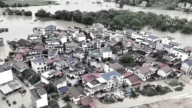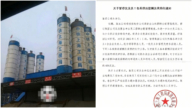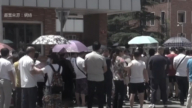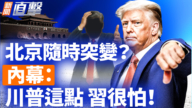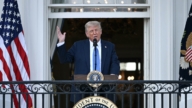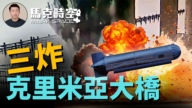【新唐人2011年12月31日讯】2011年底,世界对中国经济的看法发生了很大的改变,现在讨论最多的是,未来一年中,中国经济能否成功实现软着陆,还是彻底崩盘﹖许多外国企业也开始卖空中国资本,转向其他国家。新一代中共领导人即将上任,他们能给中国经济带来生机吗?
据经济学家分析,由于美国经济低迷,欧洲进一步陷入一场看似无休止的危机之中,外债收回的可能性非常渺茫,加上国内成本上升,出口也会随之减少。长期的分配不公,内需也不会有太大的改善。然而最头痛的还是中国的地方债务。
2008年,中共为了抑制金融危机,鼓励地方政府用土地抵押贷款,而地方官员为了升官,大势拉高当地的GDP,用了大量的土地抵押,这巨大的地方债务足以把银行拖垮。
台湾“中华经济研究院”研究员吴惠林教授表示,中国的发展是以资源为代价,现在资源耗尽,给中国造成的这种天灾型的经济灾难更难以解决。
吴惠林:“中央债务太大的时候,是会受到一些抑制的, 但是地方债2012都要到期了,他还不起,土地就被银行没收掉,可是现在土地的价格并不高,说不定没人去买,就变成呆账。”
《华尔街日报》评论指出,在权力交接的过程中,对于明显可能成为继任者的习近平和李克强来说,符合他们利益的做法莫过于遵循党的既定路线,继而巩固自己的地位。新一届领导集体必须和国有企业、地方政府和出口企业,这三方当前经济体制下的受益者达成妥协。
美国“南卡罗来纳大学”教授谢田:“中国的经济问题就是中共这些领导人造成的,他们怎么可能给中国带来新的经济机遇,这个权贵集团,通过各种方式榨取了中国人民的利益,才造成贫富不均这种局面,通过房市也好,通过股市也好,通过通胀也好,他把普通百姓的财富已经基本上榨光了。”
经济学家表示,预测中国的经济比其他国家要难得多,他们说中国经济结构急速转变,一些关键变数缺少长期的历史数据,其他方面也没有数据可循,一直以来都要依靠大量的猜测。
谢田教授认为,中国经济数据的混乱,连中共领导人也表示不可相信。
谢田:“在美国,在西方,你不管执政党的政策怎么样,首先我们必须有一个准确的描述经济现状的数字, 在中国没有,我想中国GDP增长的数字是不可信的,通货膨胀的数字是不可信的,中国人们收入的数字是不可信的,中国税收的数字,中国企业盈利的数字,所有的数据都是不可信的。”
谢田告诉记者,中共投入大量货币来刺激经济,这些钱大部分都落到了利益集团手里,他们用这些钱来炒热中国的房市,股市和楼市,楼市的泡沫面临破灭时,有些钱进入了古董市场,一旦古董市场一破灭,经济崩盘指日可待。
耶鲁大学(Yale University)教授曼沙拉马尼表示,在过去的一年里,从膨胀的信贷到屡创新高的艺术品价格等,一系列软硬指标,都是中国经济泡沫即将破灭的警示信号。
吴惠林教授认为,中国经济的破灭,不只是对中国造成很大的冲击,对全世界,特别是台湾都会产生很大的影响,他希望台湾的企业家投资大陆前要三思而行。
新唐人记者刘惠、李若琳采访报导。
Will CCP’ New Leadership Bring Vitality to China’s Economy?
The global view of China’s economy takes a big turn
at the end of 2011.
The focus is on whether China’s economy will manage
to achieve a soft landing or will completely collapse in 2012?
Many foreign companies have begun short selling
their investments in China, diverting to other countries.
Will the incoming new leadership of Chinese Communist
Party (CCP) bring vitality to China’s economy?
Economists’ analyses show that the economic downturn
in the US and Europe are affecting China too.
With US and Europe trapped in a seemingly endless crisis,
China has very slim chance to collect its external debts.
Additionally, with domestic costs’ soaring,
its exports are starting to slip away.
Plus long-term inequitable wealth distribution
does little to improve its domestic demand.
However, China’s biggest headache
Is the CCP local authorities’ debts.
In 2008, to curb the financial crisis, CCP regime encouraged
its local authorities to raise mortgage loans over lands.
The practice helped local officials to hike local GDP figures,
generating a large number of land mortgages.
The amount of local debts
is huge enough to make banks collapse.
Research fellow at Chung-Hua Institution for Economic
Research in Taiwan, Prof. Wu Hui-lin, analyses the situation.
Prof. Wu thinks that China develops
at the expense of its resources.
Now the resources are used up, which brings more difficulties
to solve such a “natural disaster” as China’s economy.
Prof. Wu Hui-lin: “When the central authorities’ debts grow
too high, they will be constrained somehow.
But local authorities’ debts are coming due in 2012.
If they fail to repay them, the banks will take away the land.
But the current land prices are not high, most likely there
will be no buyers, so they will become bad debts then."
Wall Street Journal comments, in the power change process,
Xi Jinping and Li Keqiang will most likely follow CCP’s line.
Both apparent potential successors, they’re expected to do
what is in their interests and help consolidate their positions.
The new leadership will have to reach a compromise with
state-owned enterprises, local authorities and export entities, three beneficiaries of the current economic system.
Prof. Frank Tian Xie (University of South Carolina):
“China’s problem is caused by these CCP leaders.
How could they bring China
new economic opportunities?
This elite group has milked Chinese people through a variety
of ways, triggering uneven wealth distribution in China.
They grab money through housing market, the stock market
and the inflation, civilians’ wealth has largely been squeezed."
Economists said that it is much harder to forecast
China’s economy, compared to other countries.
They think this is due to the rapid changes
of China’s economic structure.
Plus, some key variables lack long-term historical data
and there is no other data to refer to.
Thus all along, they have to resort to a lot of speculations.
Prof. Xie explains that even CCP leaders have always said,
that China’s economic data is unbelievable.
Prof. Xie: “In the US or in the West, regardless of
the ruling party policy,
we must first have figures that can accurately describe
the economic status quo. Not in China though.
I don’t think China’s GDP growth figure is credible.
Nor are its inflation rate, people’s incomes, tax revenue
and businesses profits, all data is not credible. “
Prof. Xie tells reporters that CCP’s regime poured
huge sums of money to boost the economy.
However, most of them fell into the hands of interest groups,
which used them to boost prices for housing, stock and property markets.
When the property market faced bubble burst,
some capital flew into the antique market.
Prof. Xie says that once the bubble of antique market bursts,
China’s economy collapse is just around the corner.
Vikram Mansharamani, professor at Yale University, said,
there were such signs in the past year already.
From blown-up credit to the record high prices of artworks,
a series of indicators sent warning signals that China’s economy bubble is about to burst.
Prof. Wu Hui-lin thinks that China’s economy collapse
will not merely hit hard China,
but will also have a huge impact on the world,
especially Taiwan.
Prof. Wu hopes Taiwan’s entrepreneurs will think twice
before investing in China.
NTD reporters Liu Hui and Li Ruilin



